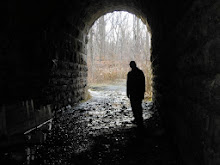It's been awhile, I see, since I last updated. Been busy as hell actually researching and writing the book! It's going a bit slower than I'd like, as I had a little bit of health trouble for a month or so and I'm in the middle of moving out of our big house and into an apartment in Alexandria. Never mind all that - there's always reasons for not getting a thing done, but it's getting done and I'm quite proud of the end result. But I will be happy to have the third chapter behind me this week. The rest will come much faster and easier.
The first three chapters have largely been about religion. Religion is the mother of all faith-based thinking. I spend a lot of time delving into the science behind religion and why we have evolved to believe the way we believe. I take the "New Atheists" to task in these chapters. They argue that religion is a delusion and an intellectual aberration - but I make the opposite argument. Religion is an evolved norm. Just because the stuff people believe isn't factual, doesn't mean there's not a good reason for believing it. I try to unpack the reasons behind belief in a way that appeals to the everyday reader. Cognition is my thing, so it was a bit tough getting that into laymen's terms.
Right now I'm taking on the Bible. It's a challenge - not because the Bible is hard to refute, but because it's so damn easy to refute. There's absolutely NO archaeological or documentary evidence to support virtually all of the major events in the Bible. Heck - the Jews didn't even invade Canaan. Modern evidence indicates that the Jews, themselves, were Canaanites and they created their origin story around their shared belief in YHWH while they were held in captivity in Babylon.
My Bible chapter, for the most part, could be one page long - or a thousand. How minutely do you refute every unsubstantiated story in the Good Book? How do you deal with the existence of a historical Jesus - after all, there's no evidence that he even lived. As historians we need evidence to make a case, but in the case of Biblical history, we take it all on face value.
My guess is, it would surprise even non-believers how little evidence actually exists in support of the historical events of the Bible. Will that stop people believing in it all? Nope.
Belief is about hope and trust. It doesn't matter what you believe in - you're putting your faith in something bigger than yourself. It's my job as a skeptical historian and as an expert in the psychology of epistemology to help people understand why they believe what they believe. Those folks who believe that literally every word in the Bible (or the Koran, for that matter) is totally factual really are deluded. The Bible, itself, makes it obvious that there are contradictions within the text. The Bible is a mythical history. My goal is to help readers understand that.
Wednesday, July 14, 2010
Subscribe to:
Post Comments (Atom)


No comments:
Post a Comment